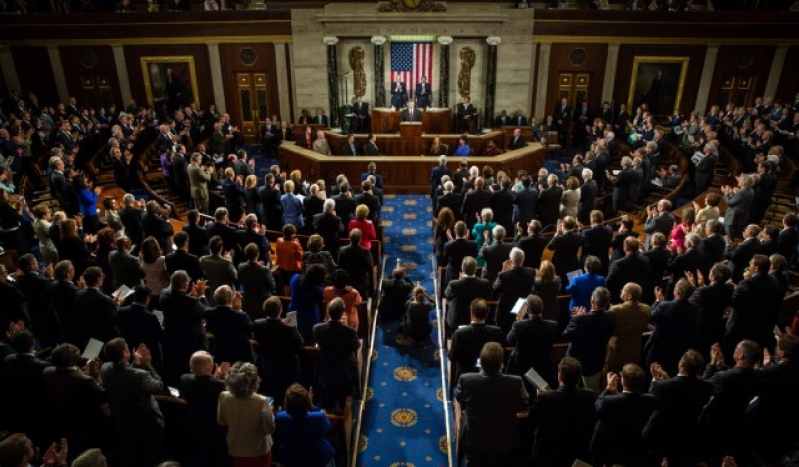
Pew Research Center on Religion and Public Life staffers released a new study that indicates one of two vastly different realities: either "a profound theological dissonance" exists between American people and those they elect as their representatives in Congress, or "a great number of those representatives lie to people who take surveys," proposes Charles P. Pierce, lead political blogger for Esquire.
The Pew Research survey, released Tuesday, indicates the incoming 115th congressional class is just about the same percentage Christian as the first class ever surveyed: 1961's 87th Congress. The 1961 group was 94.9 percent Christian; the incoming group is 91 percent. Like America as a whole, the number of Protestants has dropped (from 75 percent to 56 percent) and the share of Catholics increased (from 19 to 31).
But both Protestants and Catholics, along with Christianity as a whole, are significantly overrepresented in American politics when compared with the general population, purports Pierce. Like the nation as a whole, Congress has become much less Protestant over time.
The Pew analysis found some religious groups, including Protestants, Catholics and Jews, have greater representation in Congress than in the general population. Jews, for example, make up 2 percent of the US adult population but account for 6 percent of Congress. Other groups - including Buddhists, Mormons, Muslims and Orthodox Christians - are represented in Congress in roughly equal proportion to their share of the U.S. public. The group most notably underrepresented, according to Pew, is the religiously unaffiliated. This group now accounts for 23 percent of the general public but just 0.2 percent of Congress.
Among the 293 Republicans elected to serve in the new, 115th Congress, Pew reports all but two identify as Christians; there are two Jewish Republicans - Lee Zeldin of New York and David Kustoff of Tennessee - who both serve in the House. Democrats in Congress also are overwhelmingly Christian (80 percent), but there is more religious diversity among them. The 242 Democrats in Congress include 28 Jews, three Buddhists, three Hindus, two Muslims and one Unitarian Universalist, as well as the only member of Congress to describe herself as religiously unaffiliated, Rep. Kyrsten Sinema, D-Ariz. In addition, all 10 members of Congress who decline to state their religious affiliation are Democrats, according to Pew.
In 1961, 93 percent of respondents in a Gallup poll identified as Christian, while just 2 percent answered "none." Since 2007, that share of "nones" jumped from 16 to nearly 23 percent. In the same time, the percentage of Americans who call themselves Christians dropped 8 percent, to 70.
Because the US Constitution expressly forbids religious tests for any political office, Pierce said Americans have "decided to create them [religious tests] ad hoc based on their general impression of the various candidates under consideration."
"Someone who agrees with you on, say, tax cuts or the environment is presumed to agree with you on the Trinity or transubstantiation," he stated in Esquire. "Piety in our politicians is simply assumed even when it's as silent as the 'W' in "wrong."
Pierce also stated he believed the term "Christian" has become such a "baggy one" in US politics, it's come to mean almost anything. "In its most effective political form, it means a certain splinter of American Protestant fundamentalism. It's a political signifier as much as it is a statement of belief," he said.
But he reasons the loose definition of the Christian term may change because there are now more members of Congress from other faiths than there ever have been before. "But, for the moment, I suspect 'Christian' in politics will continue to be defined more in terms of the Billy Graham Crusade than anything else," he stated.
Meanwhile, he said the "drift away" from the various formal monotheisms in the general population hasn't yet developed a "political salience" of its own. "It is very unlikely to do so any time soon, either. There is a deep suspicion of any politician who publicly claims to be unchurched," he wrote.
"An overwhelming majority of people who identify their politics with their fundamentalist Protestant religious principles just voted in a president who, by any reasonable definition, is as close to a heathen as anyone we've ever elected."
Pierce said he believed Americans would rather elect people who feign a faith in public from which everyone is drifting in private. "We argue about 'faith-based' politics, because that's easier than grappling with the question of faith itself."






